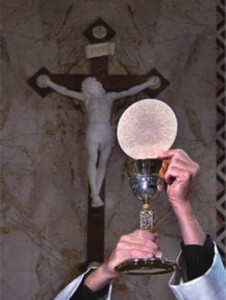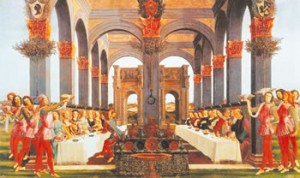A Foretaste of Heaven
After my last column on the “Lamb of God” as one of the most hallowed Christian phrases for referring to Jesus, I was asked by a reader to explain the phrase “the supper of the Lamb”.
The phrase is from the Invitation to Communion when, after genuflecting, the priest takes the host and holds it above the paten or above the chalice and, in the Latin, declares:
"Ecce Agnus Dei, ecce qui tollit peccata mundi. Beati qui ad cenam Agni vocati sunt".
There are two changes in the novus ordo from the Latin mass as it was celebrated before the Vatican Council or in the Extraordinary Form. They are in the instruction to make only a single genuflection rather than three, and that the chalice may be raised with the host rather than the paten. The Latin text of what the priest says is unchanged. This invitation has been used in the Liturgy for many centuries.
It is often a surprise to Catholics just how biblical the texts of the mass are. We know the readings are from the Bible but we often fail to identify how many of the prayers are direct citations from or allusions to scriptural passages. This one line of Latin is a good example. The invitation uttered by the priest is a line from John the Baptist (John 1:29) followed by the words of an angel (Revelation 19:9).
John 1:29
Altera die videt Iesum venientem ad se et ait: "Ecce agnus Dei, qui tollit peccatum mundi." (Vulgate)
The next day he saw Jesus coming toward him, and said, "Behold, the Lamb of God, who takes away the sin of the world!" (RSV 2nd Catholic edition)
Revelation 19:9
Et dicit mihi: "Scribe: Beati, qui ad cenam nuptiarum Agni vocati sunt!".
And the angel said to me, "Write this: Blessed are those who are invited to the marriage supper of the Lamb."
The line from Revelation is the climax of a hymn dubbed “The Song of Victory” (Rev 19:5-9) proclaiming the wedding day of the Lamb. The Roman liturgy sadly omits one word from the Revelation text which makes it clear that this is no ordinary meal, the word “nuptiarum”. This is a marriage feast not a normal evening meal. The prayer is so ancient we have no evidence as to why it is in the form it is. I do know there are manuscript versions of the Greek text of the book of Revelation which omit the “of the marriage” from the verse. It literally reads (in Greek) “Blessed they who to the supper of the marriage of the Lamb are called.” In that one manuscript tradition the scribe copying made the easy mistake of skipping from one “of the” to the next, leaving out “of the marriage”.
Our consuming the eucharist is giving us a share in the “bread of tomorrow” a literal foretaste of heaven.
Once the scriptural reference is recognised the sense is clearer. The supper does not consist of mutton, it is the wedding banquet of the Lamb of God. The Bride is the Church personified, Jesus Christ is the groom. God’s chosen are there as invited guests. This is the heavenly banquet, the end-time celebration of the reign of God. In being invited to holy communion we are invited to the eschatological banquet in heaven. Our consuming the eucharist is giving us a share in the “bread of tomorrow” a literal foretaste of heaven. The ambiguity in the phrase “of the Lamb” is deliberate, because Christ is the sacrifice as well as the one offering it. When we eat the host we are eating the Lamb of God. It is his wedding but he is also the paschal victim that is the food of the feast. The Jews of the Exodus ate the Passover lamb who was slaughtered in the place of their first born sons. We, too, consume Christ, the Lamb of God, when we take communion. He is present under the form of bread and wine in his humanity and his divinity, body and soul.
So "Ecce Agnus Dei, ecce qui tollit peccata mundi. Beati qui ad cenam Agni vocati sunt." carries a huge load of theological and spiritual significance. The challenge is how to translate it into English. The version we were using was criticized for its banality:
“This is the Lamb of God
who takes away the sins of the world.
Happy are those who are called to his supper.”
This is now rendered as:
“Behold the Lamb of God,
behold him who takes away the sins of the world.
Blessed are those called to the supper of the Lamb.”
The double “behold,” which is not conversational English, has more punch than “This is.” Likewise “blessed” seems stronger than “happy.” Scott Hahn, who wrote a book entitled The Lamb’s Supper: The Mass as Heaven on Earth, commented on the change in the next line:
There’s a world of difference between this response and the old rendering: “Happy are they who are called to his supper.” The old version suggests dinner time, and so it is. But the new version suggests much more: the climax of the Scriptures and all salvation history!
Certainly the new translation is closer to scriptural translations like the Revised Standard Version which helps alert us to the biblical texts behind the prayers. We are being invited to communion, but in words that come from the gospel and the Book of Revelation. The invitation is to considerably more than this celebration.


 Entries(RSS)
Entries(RSS)